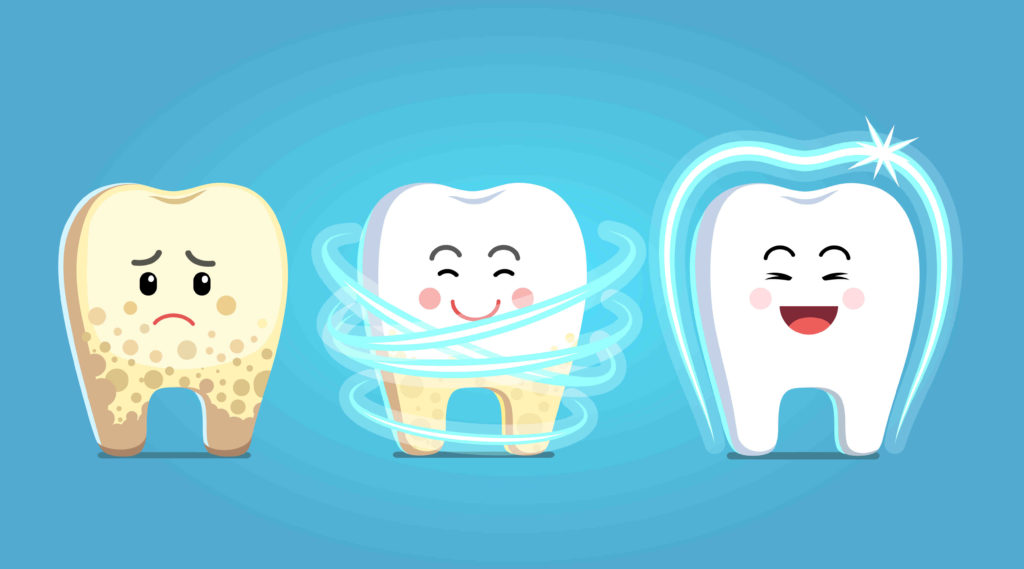Tooth scaling may not be the most pleasant of times, admittedly. Some people go to their dental appointments reluctantly, apprehensively, even with a healthy dose of fear. Others tend to skip the scaling. And yet, this dental care is essential to preserve your oral health. HELVIDENT explains how the procedure works, so you can go in with peace of mind. You'll leave with a brighter smile !
What is the purpose of tooth scaling?
Every time we consume food and drink, residues build up inside our mouths. These sugars, acids and bacteria nestle mainly between the teeth and gums, as well as in the interdental spaces. This is known as tartar and, over time, it mineralizes and becomes plaque.
By adopting a good oral hygieneBy brushing your teeth, you'll be able to remove the majority of tartar and plaque. To do this, brush your teeth at least twice a day, for at least two minutes each time. You should also use an interdental cleaning accessory on a daily basis. Smoking worsens the situation, darkening tartar and weakening gums.
Professional tooth scaling is essential, as some areas are difficult to reach. A dentist or dental hygienist in Lausanne or Fribourg can perform a thorough cleaning using special tools.
Wondering how often to have your teeth scaled? The formation of tartar varies from one person to another, depending on eating habits, oral hygiene and dental health. tobacco consumptionoral hygiene and saliva production. Saliva plays a major role in the natural cleaning of the mouth after each meal. On average, it is recommended to have a scaling once a year.
How can you prevent limescale build-up?
There are certain things you can do to reduce the build-up of plaque and tartar in your mouth. Here's our advice:
- Brush your teeth at least twice a day, ideally after every meal.
- Use dental floss or interdental brush to remove food residues from areas that cannot be reached with a toothbrush.
- Eat a healthy, balanced diet, low in sugar and fat.
- Avoid smoking.
We invite you to ask your dental hygienist for more advice at your next visit.
How a tooth scaling session works
Here are the steps involved in a tooth scaling consultation in Lausanne or Fribourg.
In-depth visual examination
Your dentist or dental hygienist begins with a thorough inspection of your oral cavity. He or she uses a small mirror to check the condition of teeth and gums, and then checks the depth of gum pockets with a periodontal curette. In the case of gingivitis or other oral health problems, the practitioner will recommend that you treat them before performing dental scaling.
Supragingival scaling
Most dental practices in Lausanne and Fribourg are equipped with ultrasonic instruments. These emit vibrations that loosen tartar from the gum line. A probe then sucks it out. It's painless in most cases. A small tube sprays water continuously into your mouth to help remove the particles. The more tartar in your mouth, the longer this operation takes.
Interdental cleaning
There's nothing like professional interdental cleaning to get rid of the tartar that builds up between your teeth. Thanks to his expert instruments, he can dislodge the residues hidden in every nook and cranny of your teeth.
Polishing
At the end of the session, the dentist or dental hygienist begins smoothing the surface of your teeth. This procedure, known as polishing, removes any stains. It is performed using a polishing machine and polishing paste. This treatment gives your teeth a radiant shine.
Rinsing
Finally, the practitioner invites you to rinse your mouth with water or a fluoride solution. This removes all residues. The treatment is complete!
We recommend an annual check-up to assess the health of your teeth. Tartar build-up can lead to bad breath and a host of other problems. HELVIDENT's three dental clinics are home to a full range of oral health professionals. We welcome you in Lausanne, Fribourg and Aigle. Don't hesitate to contact us to make an appointment.

